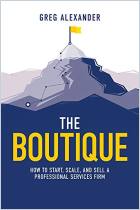Join getAbstract to access the summary!

Join getAbstract to access the summary!
Colin Barrow
Get Backed, Get Big, Get Bought
Plan your start-up with the end in mind
Capstone, 2009
What's inside?
Do you have an idea for a profitable start-up? You can score by getting funding, building the firm and then selling it.
Recommendation
Entrepreneurship expert Colin Barrow promises that selling your company is the path to big bucks. The problem is that first you have to start a business and make it successful. Barrow details all the ins and outs of this lucrative practice, from writing your business plan and securing funding to expanding your company and preparing an “exit strategy.” He tailors his information to businesses in the U.K., but most of the principles apply universally. Thus, getAbstract recommends Barrow’s practical guide as informative, encouraging reading for any entrepreneur with the next great business idea. Heeding his sound advice could help you follow in the footsteps of Bebo founders Michael and Xochi Birch, who in 2008 sold their popular networking site to AOL for £417 million.
Summary
About the Author
Colin Barrow teaches entrepreneurship at numerous business schools and has published books and other publications on the topic.























Comment on this summary